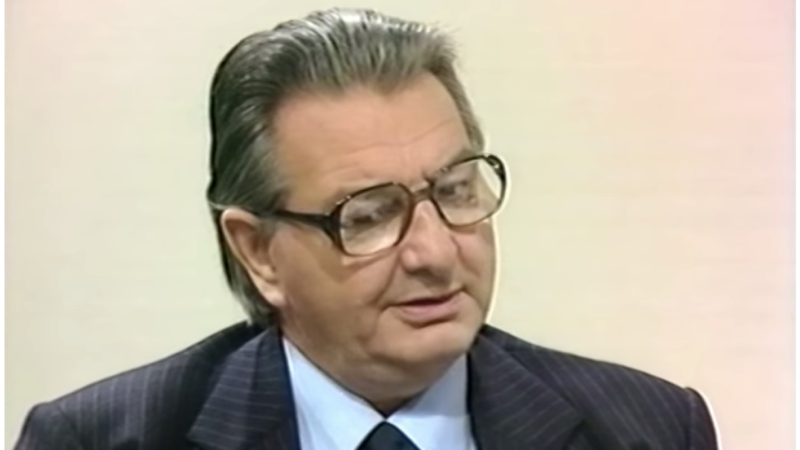
“A defiant man of the left.” That was how Walton’s Dan Carden recently described Eric Heffer, the constituency’s longest-serving MP, at the first ever memorial lecture in his name. In front of more than 100 Labour members and supporters at the Capstone Theatre in Liverpool, the Shadow International Development Secretary gave a touching, humourous account of Eric, who turned the seat into a stronghold for the Labour Party.
Dan paid tribute to Eric’s life and legacy, and explored how his ideas of internationalist, democratic socialism can be applied today. “In his own words he was never a yes man,” began the Liverpool Walton MP, as he described what he said was an “enduring image” of Eric storming off stage at Labour conference in 1985, after Neil Kinnock denounced the actions of the Militant-dominated Labour council.
Born in Hertford to a working-class family in 1922, he learnt the trade of a joiner and worked in construction from the age of 16. He originally joined the Communist Party, and was also active in the Amalgamated Society of Woodworkers (ASW). “He would say he was not only born into the working class, but into the labour movement,” said Dan.
Throughout World War II, he served in the Royal Air Force in a maintenance unit in Fazakerley, Liverpool. It was during the war that he met his wife Doris at a Communist Party meeting, and they married after the war ended in 1945.
Eric returned to Liverpool in the late ’40s, when he threw himself into trade unionism. By then, he had rejected the Stalinist model and was kicked out of the Communist Party in 1948 for factionalism. He finally joined the Labour Party and became a delegate to the Liverpool Trades Council. He was influenced by the likes of Eugene Debs and Rosa Luxembourg, who was murdered a hundred years ago. “He found that [Luxembourg] represented all that was good with the socialist movement,” added Dan.
“He didn’t just see politics in terms of organisation and struggle but in terms of culture, and he was fascinated by working-class artists like Arthur Dooley and Adrian Henri.” In the late ’50s, he became chair of Toxteth Constituency Labour Party, and spoke on many CND platforms before becoming a councillor and eventually the Walton MP in 1964, where he stayed until his death in 1991.
Dan said: “Eric was asked once, ‘can Walton be described as beautiful?’ Taking it as a whole, the answer must be no, except for its people. There is a fierce pride in being a Liverpudlian, but to be a Waltonian is even better.”
Eric thought that, to achieve its aims, Labour should use the ballot box but also use extra parliamentary activity such as demonstrations, marches and strikes. “The two are complimentary,” he said, later calling the miners’ strike“the greatest struggle of workers in Britain since the general strike of 1926”. He stood in the tradition of Labour’s first parliamentary leader Keir Hardie, saying that “there cannot be socialism without democracy – the two are indivisible”.
As an internationalist, Eric had a simple approach to determining his foreign policy outlook, said Dan. He saw it as the Labour Party’s duty to support any group, anywhere in the world, that was fighting for independence and freedom. On a visit to Chile with MPs, President Allende described a vision of a socialist society that chimed with his own. No vast bureaucracy, but freedom, democracy, music and dance. After the US-backed coup in 1973, Eric wrote: “The ruling class only believe in democratic socialism when it supports them. When it doesn’t, they destroy it.” And when parliament was recalled to debate the Kuwait invasion in 1990, Eric would give his last speech in the House of Commons to urge the United Kingdom not to go to war.
Speaking at the lecture, Dan said: “His lifetime pursuit of democratic socialism within the Labour Party is something I believe we are closer than ever to achieving under the leadership of Jeremy Corbyn.” The MP went on to speak of the UK’s relationship with the European Union ,and how Eric had supported, then rejected, membership of the European Economic Community. He was sacked from the Wilson government in 1975 for doing so but never lost his sense of priority, later writing: “I believe we should work for socialist and working-class internationalism in Europe without making the EEC the major issue of contention.”
Dan said that Eric believed a truly socialist democratic Labour government must eliminate a class society, and made the case for public ownership as set out in the old Clause IV of the constitution. Neither did he want an all-pervading state, but instead many and varied forms of public ownership.
Labour’s frontbench was still committed to that vision, Dan told us, before ending with the words of Tony Benn. “Eric will be remembered as a teacher, and teachers leave deeper footprints in the sands of time than those who passed by in their ministerial limousines. Above all, he taught us how to live and taught us how to die. No one can be expected to do more than that.”
Stephen Delahunty is a freelance journalist.




More from LabourList
‘Labour is being badly misled on housing’
Reeves bets on patience over populism
‘Energy efficiency changes must work for older private renters’